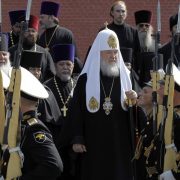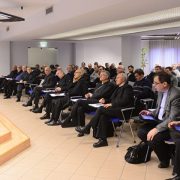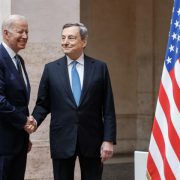Religious London is an exciting new report published on 24 June 2020 by Theos Thinktank. London is often characterised as one of the major global cities leading the way in progressive cultures that seemingly leave religions behind to reach that ideal of progression. Yet, the picture is much more mixed. Researchers Paul Bickley and Nathan Mladin present findings that show London to be more religious compared to the rest of Great Britain (GB). As the report summary states, «London’s religious micro-climate is paradoxical: a secular, liberal and cosmopolitan city in which religion is becoming more visible and significant». A key question, I think, is how religion is “visible” in this context.
What does the data show?
Overall, London is the most religious region in Britain with 62% of London citizens self-reporting as religious «compared to 53% in GB, excluding London». Looking at the data in detail reveals how London diverges from the rest of GB. For example, 35% of London Christians identify as Catholic (it’s 15% in GB) and 33% of London Christians report as members of the Church of England (55% in GB). London has a higher non-Christian religious population than the nation as a whole. The report describes how «One fifth of London’s population, compared to 7% in GB (excluding London), identify with a non-Christian religion», before nominating the largest group as Muslim. Also included in the report is the considerable non-religious population at 33%, but this sits against a figure of 45% for Great Britain as a whole.
Religious practice and civic participation
The general trend observed in Religious London is that while Londoners are more religious than other British citizens, they also practice their religion (quantitatively) to a greater extent. For example, it found that 30% of Christian Londoners frequent services and «pray regularly», whereas the figure nationally is 13%. Moving from religious practice to the impact of religion on civic participation there is a significant observation that «63% of regular attenders at a religious service (across all religions) said that they were likely or very likely to volunteer, compared to 37% of people who say they never attend a religious service».
Although religion is widely acknowledged as a motivator (social capital) for civic practices such as volunteering, the study cannot identify religion as the sole indicator for the higher level of a desire to volunteer. Volunteering is a complex phenomenon that is driven by multiple factors. Perhaps, as this research shows, frequent religious practice is a general framework for the increased desire to volunteer but a more nuanced study would ask what it is about religious practice that influences the choice to volunteer. Is it the social bond? Is it a teaching on social outreach or poverty? Is it a religious obligation?
Outlining this data will provoke a series of different responses. Perhaps the religious diversity of London is not surprising given its position as a global city that sits at odds in some ways with the nation as a whole. As cities are globalised and function according to different fluxes and processes, the concept that the capital is representative of the national population as a whole is put to the test. Capitals alone do not narrate the national story: there are other cities, rural communities, and all in-between areas that comprise the nation.
On a final note, Religious London begins with a haunting stanza from T.S. Eliot’s Choruses from “The Rock” (1934) that I repeat here. Unlike the speaker in this poem Religious London shows that bells and other religious sounds are “needed” in the city as much as in the «suburbs».
I journeyed to London, to the timekept City,
Where the River flows, with foreign flotations.
There I was told: we have too many churches,
And too few chop-houses. There I was told:
Let the vicars retire. Men do not need the Church
In the place where they work, but where they spend their Sundays.
In the City, we need no bells:
Let them waken the suburbs.





